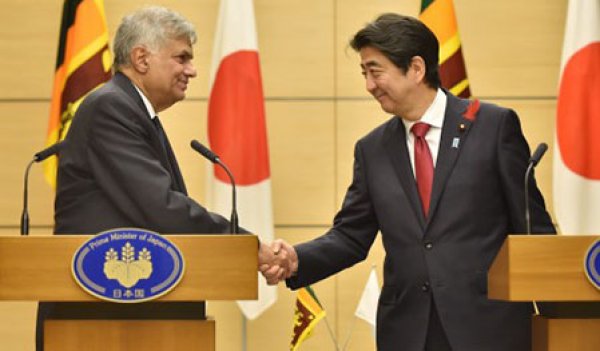Their talks were held at a time when Sri Lanka’s new government under President Maithripala Sirisena is shifting away from a pro-China policy and trying to strike a balance in its ties with China, Japan and India.
Japanese officials have stressed the importance of having the Abe-Wickremesinghe talks as the president, who was re-elected in January, is reviewing the stance of Sri Lanka’s previous leadership which favored China in infrastructure development projects.
With Sri Lanka lying in an important geographical location near Middle Eastern shipping routes in the Indian Ocean, vital for the export of the region’s oil to the east, Japan wants to cement bilateral ties and support Sri Lanka’s political and economic reforms. Sri Lanka, meanwhile, seeks more foreign investment.
The leaders said in a joint declaration released after their talks at Abe’s office that they “decided to hold an economic policy dialogue at the senior officials’ level in the first half of 2016” to map out details of their economic cooperation.
Wickremesinghe, for his part, promised that Sri Lanka’s new government will “create a more favorable investment climate, ensuring transparency and good governance to attract investment from Japanese companies.”
In line with Japan’s efforts to develop high-quality infrastructure in Asia, the two countries have signed a document about the upgrade of an airport in Sri Lanka. The two leaders also said they will cooperate more closely in urban transport infrastructure and information and communication technology in Sri Lanka, the joint declaration read.
Maritime security was also one of the key topics during Tuesday’s talks. In light of China’s growing assertiveness at sea, Abe reiterated Japan’s pledge to help Sri Lanka in its maritime security capacity-building, including Tokyo’s plan to provide patrol ships, according to the declaration.
The two reaffirmed the “importance of the freedom of navigation and overflight of the high seas” and expressed hope a dialogue on maritime affairs will take place by the end of this year, the declaration said.
Abe also unveiled that Japan will train about 1,800 Sri Lankan local public officials by next year, and support the reconstruction efforts of Sri Lanka following decades of civil war.
(scmp.com)






